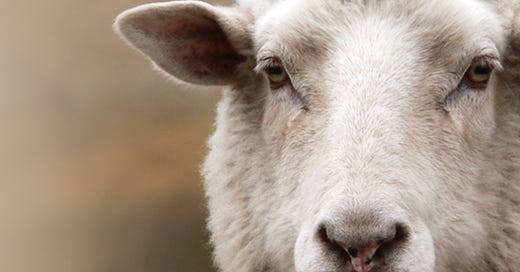
Live Sheep Export: Labor’s Sacrificial Lamb
The Albanese government manufactures political support using sacrificial lambs. One lamb lined up for sacrifice is the live sheep export industry. The Department of Agriculture, Fisheries and Forestry website currently states that “The Australian Government has committed to phasing out live sheep exports from Australia by sea”.
Labor demurred when questioned pre-election, but the WA Labor platform clearly articulates the party’s position: “WA Labor recognises that there are strong economic, jobs and animal welfare reasons for transitioning from the live export trade to domestic processing of animals for local consumption and the chilled and frozen meat trade.”
Farmers Forced to Cull
Due to the La Niña system of the past three years, Australia has an excess of approximately 640,000 sheep. The incoming El Niño weather system will bring warm dry conditions, impeding feed growth. A recent report by Australian Bureau of Agricultural and Resource Economics and Sciences states that Australia’s agricultural sector will shrink by 14% in 2023-24. Simultaneously, Labor is pushing ahead with its live sheep export ban plan.
Both have contributed to the mutton price dropping from $100 per head in January 2023 to a devastating $1 per head over the last couple of months.
The government has played the live sheep export industry for a fool.
Trucking sheep to sales yards is particularly expensive currently, and there have been cases of unsold sheep returned to the farm at the producer’s expense.
In the face of this terrible confluence of factors, some farmers have been forced to shoot their sheep. A heartbreaking waste of life, work and resources.
World-class Sheep Welfare
Australia’s live sheep export is conducted by two exporters based in Western Australia. Sheep are sourced from across the state. An entire industry supports the complex logistics involved in this supply chain.
Throughout the live export process, sheep welfare is subject to rigorous oversight. Of over 100 countries that export livestock, Australia is the only one requiring adherence to specific animal welfare regulations for exported livestock, including after arrival in the importing country. These regulations include:
Farmgate to the ship: Australian Standards for the Export of Livestock 2021; and
Importing countries: Exporter Supply Chain Assurance System (ESCAS) 2011.
On board the ships, sheep are accompanied by an Australian-accredited veterinarian. Vets complete three rounds of the decks per day. In addition to this, sheep are inspected before, during and after their journey by additional accredited animal health professionals. To ensure exporters are compliant with Australian welfare guidelines, each part of the supply chain across Australia and importing countries are also audited by independent, qualified entities at least once a year. Auditors review:
Animal handlers and their techniques; and
Facilities: ports, transport vehicles, feedlots, abattoirs.
Treacherous Memo
Known for its world-class standards, Australia raises robust and sought-after sheep. For multiple reasons, both cultural and economic, the countries in the Middle East prefer live export over chilled meat.
Formerly, Saudi Arabia was Australia’s prime sheep market, reaching one million sheep annually until trade ceased in 2012 due to that country rejecting Australia being involved in welfare once the sheep have arrived. Efforts have been underway to reopen live sheep exports to Saudi Arabia, compliant with Australian standards, through a revised health protocol. This would significantly boost the Australian sheep industry and potentially more than double current exports.
The Federal government states that access to the Saudi market is open, subject to meeting Australian requirements and ESCAS regulations. However, this statement is in direct contradiction to its own actions. Documents obtained via freedom of information state that bureaucrats advised Agriculture Minister Murray Watt in a department memo in January of 2023 that they were ending negotiations with foreign governments regarding new live export agreements.
Australia’s agricultural sector will shrink by 14% in 2023-24. Simultaneously, Labor is pushing ahead with its live sheep export ban plan.
This was months prior to Watt deploying his panel to consult on phasing out live export. The Department announced this in spite of interest in live sheep export agreements from multiple countries including Saudi Arabia, Morocco and Kuwait. The government has played the live sheep export industry for a fool.
Kuwait has indicated it regards Australia’s live export ban policy as hostile. Kuwait’s Commerce and Industry Minister, Mohammad Othman Al Aiban wrote to Minister Watt stating the ban will imperil relations between Australia and importing countries.
Farmers
On the Department of Agriculture, Fisheries and Forestry website, the government assures us that, “The phase out will not take place during this current term of the Australian Parliament.” This attempt at reassurance rings hollow, considering the department’s memo on ceasing negotiations.
The treacherous actions of the Department, and lack of a specific timetable, means that farmers have no way of planning for the future. Agriculture carries a high level of unpredictable risk, including droughts, floods and bushfires. The Labor government has heaped an unnecessary burden of risk and uncertainty on the industry.
Labor’s duplicitous blundering will potentially deliver catastrophic consequences for the entire industry. As we have seen so often, government intervention in trade leads to tears.
The post Live Sheep Export: Labor’s Sacrificial Lamb appeared first on Liberty Itch.












